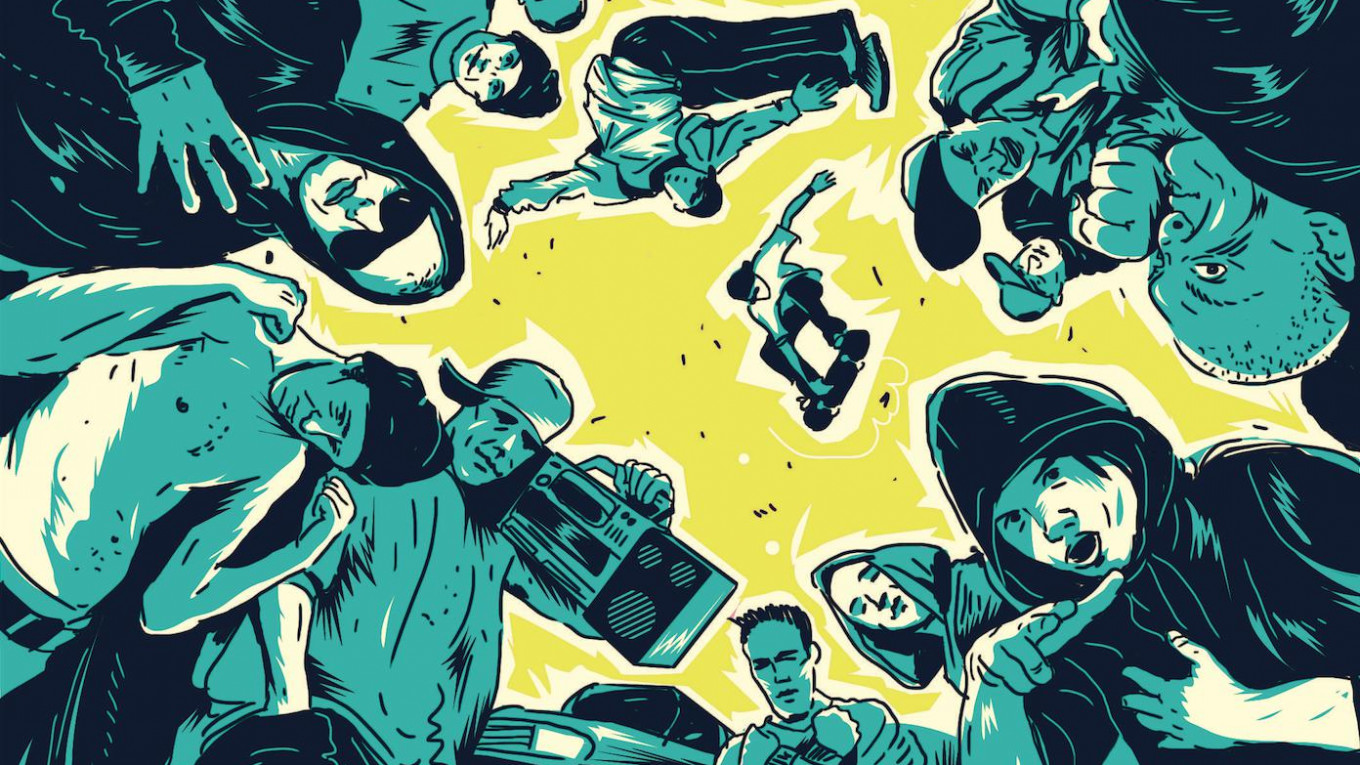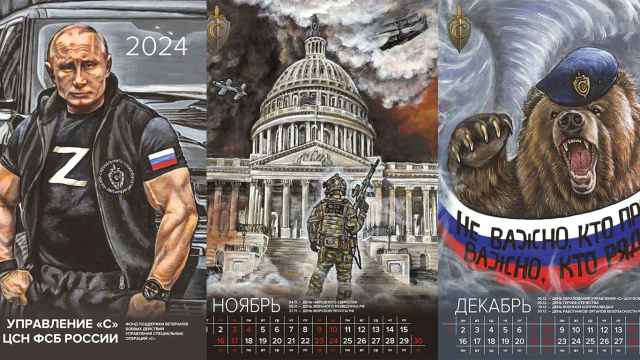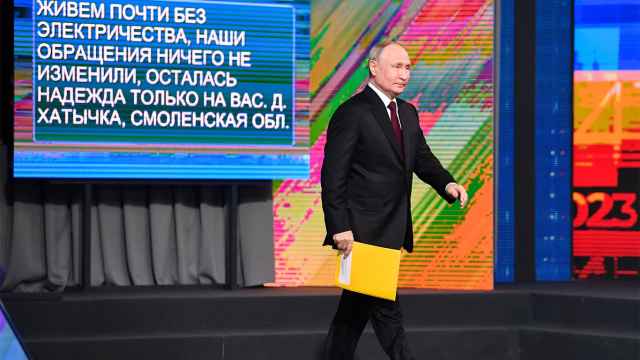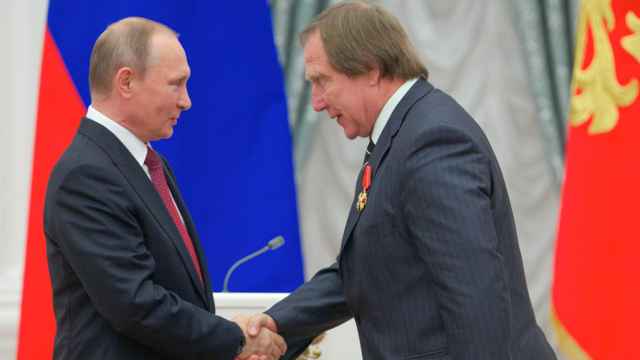Alexei Ponomaryov doesn’t look like a rapper. Dressed in a red plaid, buttondown shirt and khaki pants, he speaks softly, grinning awkwardly from time to time.
It’s a far cry from the aggressive image portrayed in his music.
“I’m a national traitor/I’m the fifth column/My Russia’s far from yours/You jail people, start wars/But we have soldiers too/A huge army to our rescue,” Joker James— Ponomaryov’s stage name— roars in “No Fun.”
As an artist popular mostly among Moscow’s liberal youth, Ponomaryov avoids the cliches associated with Russian rap’s mainstream — fast cars, beautiful women, and blingy lifestyles. But his story reflects both the growing popularity of Russian rap, and its power to address the realities of everyday life.
Ponomaryov is no stranger to the music business, after ten years performing alternative rock. But last year he decided that rap was a better medium to express his thoughts on Russian politics and society.
“Rap is street culture,” he says. “It’s better protest music.”
Straight Outta da Soviet Union
Rap arrived in Soviet Russia nearly ten years after it appeared in America. Critics often date its emergence to the release of “Rap,” a 1984 album by the group Chas Pik. By today’s standards, “Rap” is an oddity—a weird mixture of Russian and English-language rapping influenced by Grandmaster Flash and interspersed with retro-tinged rock songs. Then, it was ahead of its time.
By the start of the 1990s, groups like Bad Balance and Malchishnik, as well as individual performers Lika Star and Delfin, began to popularize rap. Soon, the genre was blaring from radios and MCs were appearing on television.
Early rap was hardly political. It took on subjects that were considered taboo under the Soviets.
“Rap was interesting to Russians because it openly sang about sex, drugs, and conflict with the police,” says music critic Artemy Troitsky, who chaired the jury of the first Russian rap festival, held in Moscow’s Gorky Park in 1990.
He cites rap trio Malchishnik’s 1991 hit “Nonstop Sex” as an example of the genre’s scandalous, but innovative art. In a song clearly imitating the Beastie Boys, the three performers—Delfin, Mutabor, and Den—graphically describe having sex with a girl, one after the other.
The nearly pornographic song, which grew wildly popular, was “a big step forward for the culture of sexual revolution,” Troitsky says.
Moscow Bling
If rap was once the cutting edge of Russian music, today it is an undeniable part of the mainstream. Rap has its own stars and hits. It has even received official recognition.
In 2009, Russian President Vladimir Putin, then prime minister, appeared on the rap television show “Battle for Respect” to praise the music, which he termed an “art form.” He hailed rap for its “social content” and for “speaking about the problems of youth.”
Rap has occasionally returned that praise. Timati, the stage name of Timur Yunusov, is perhaps the biggest star of mainstream Russian rap. He is also one of the president’s biggest fans.
In 2015, to commemorate the president’s 63rd birthday, he and rapper Sasha Chest released a special music video. Swaggering across a smoke-filled Red Square, Timati raps the line, “My best friend is President Putin.”
However, most of Timati’s work—like the majority of Russian rap—is more concerned with entertainment than it is with politics.
In the music video for his song “Baklazhan” (“Eggplant”), Timati cruises the Moscow streets in a purple Lada sedan. When he spots a pretty girl, he sings, “Oh what an ass, what tits! Give me your number quick!”
Interestingly, in the video, Timati depicts himself as a gold-toothed migrant from Central Asia or the North Caucasus—racial groups derogatorily referred to as “blacks” in Russian. The performer is, in fact, of Jewish and Tatar ancestry.
Other Russian rap groups reinterpret American “gangsta” culture. “Krovostok” (Bloodstream) raps about drug abuse and violence. Their song “Dumbbell” tells the story of a hoodlum on a killing spree using exercise equipment to mutilate his victims. Like much of their work, it’s considered intellectual satire.
Young rappers like Pharaoh have a different vibe. Although popular among teenagers, his nihilistic songs are basic in the lyrics department. In the music video for the 2015 hit “Black Siemens,” Pharaoh and his friends dance limply around a car while chanting a string of nearly unrelated words.
“Skrt-skrt, skrt-skrt (in dead Nikes!)/ Skrt-skrt, skrt-skrt (in a white shirt),” he sings. Fans are still debating the exact meaning of these words online.
Music critics scoff at popular artists like
Pharaoh. But for many of Russia’s youth, they
represent the contours of the country’s rapidly
changing musical landscape.
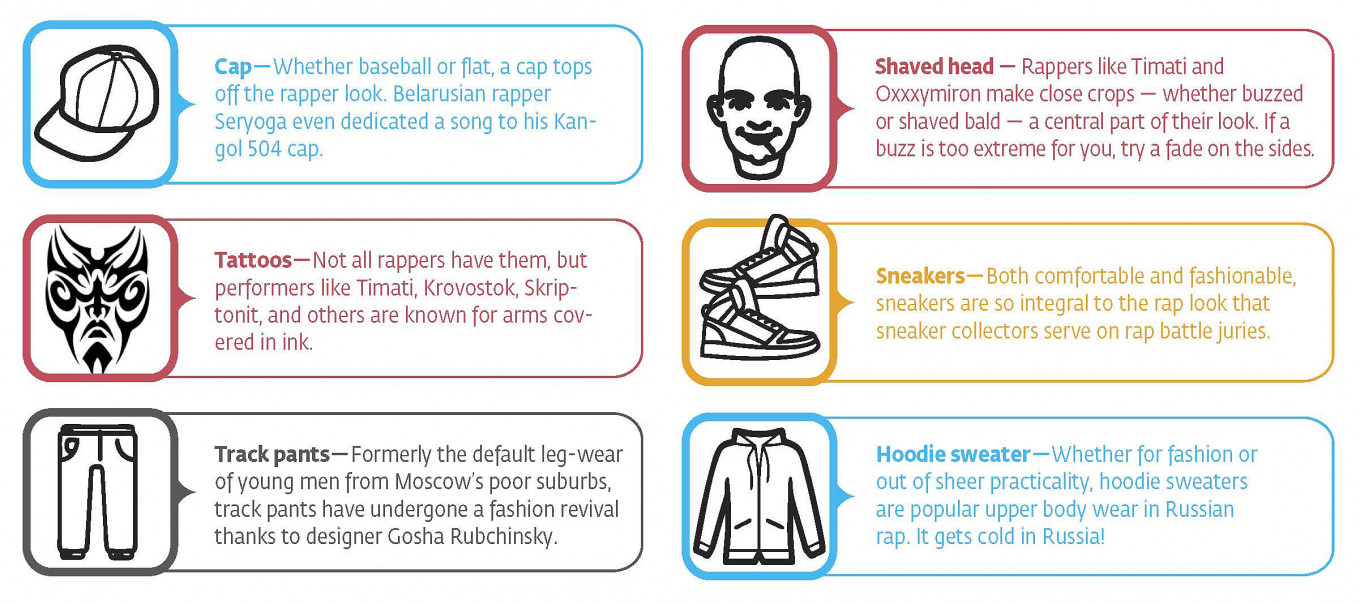
Hip Hop for Respect
“I’ll make a meal out of you!” a young man shouts at another as an excited crowd looks on. “You are about to become fertilizer / You’re here not for victory / But for my approval!”
This is a rap battle between
Russia’s Oxxxymiron
and JohnyBoy of Riga, Latvia.
Filmed in St. Petersburg as
part of the Versus rap battle
series, the video has clocked
in over 31 million views on
YouTube. The insult slinging
may seem crude, but these
battles are giving rap its edge back.
It is difficult to explain the run-away success of rap battles, but many cite the aggression as part of the appeal.
“Everyone likes confrontation,” says rapper Den Cheney, a 24-year-old organizer of the #SLOVOSPB rap battle series in St. Petersburg. “Together with rap, it’s the ideal recipe for a good show.”
At their best, rap battles involve humor, creative insults, and fast rhymes. In Russian practice, Cheney admits there are a few repeated themes: “Usually your opponent’s sexual orientation, or sexual contact with their close relatives.”
Still, the average battle video gets upward of 2 million views, which can help propel young performers to stardom.
Miron “Oxxxymiron” Fyodorov is the perfect example of this. Born in St. Petersburg, the rapper grew up in Germany and studied at Oxford—hardly a stereotypical hip hop pedigree. But his performances in battle have helped make him Russian rap’s biggest rising talent. And keeping that reputation takes work. Oxxxymiron is currently preparing for an upcoming battle with Vyacheslav “MC Gnoiny” Karelin.
“The expectations are overheated,” says Serob Khachatryan, a Russian journalist who has extensively covered the music. “It’s the most discussed topic in Russian rap.”
On occasion, the rap battles flirt with controversy. In a July 2016 battle with Karelin for the Versus series, Dmitry “Ernesto Zatknites” Romashchenko rapped, “even the [Russian Orthodox] Patriarch was once a sperm,” provoking a hostile response from the audience.
Later in the battle, Groiny told Ernesto, “Your so-called friends are just as non-existent as the Ukrainian nation.” Both lines were censored in the online video of the battle.
Protest Anthems
In August 2014, under the west Ukrainian night sky, festival-goers cheered and waved glow sticks in the air. Noize MC, Russia’s most controversial rapper, had taken to the stage to sing “Tantsi,” a dubstep-inflected song mixing the Ukrainian and Russian languages. In the ecstasy of the moment, he reached down into the crowd to grab a Ukrainian flag from a fan, wrapping it around his waist and dancing.
During the war in eastern Ukraine, “that was enough to become a ‘traitor of Russia,’ an ‘accomplice to fascism,’ and ‘sellout political whore’ overnight,” the artist, known as Ivan Alexeyev off stage, told the Moscow Times in an email exchange.
Alexeyev is no stranger to controversy. In 2010 he became a household name with the release of “Mercedes S666,” a song criticizing the Russian justice system’s failure to punish a Lukoil executive, after his alleged reckless driving led to a car crash that killed two women.
The star insists he isn’t political—“just an artist who cares what goes on in society.” But Noize MC’s 2014 performance in Lviv proved to be a step too far for the Kremlin. Over half of his shows were immediately cancelled in Russia. At other shows, he faced crude intimidation tactics.
“You play 5 songs and then a guy in a mask with an AK-47 climbs on stage and stops the show,” Alexeyev says. The border between acceptable and unacceptable performances “depends entirely on the mood of those Lubyanka guys,” he adds, referring to the security services.
Other emerging artists are playing this balance carefully. Khaski, one of the most critically acclaimed young artists, released a song on Putin’s birthday in 2011 describing how “the king and his entourage feast, while the people are poor.” Later, he socialized with nationalist writer Zakhar Prilepin and even travelled to separatist-controlled Ukraine with him. But the performer’s most recent songs lack overt political statements.
As he works on his first full-length album, Alexei Ponomaryov, who referred to himself as a “national traitor” and the “fifth column” in an earlier song, says he isn’t particularly worried about running afoul of the authorities. His music may comment on politics, but its primary purpose is artistic.
“My goal isn’t to bring people out into the street,” he says.
A Message from The Moscow Times:
Dear readers,
We are facing unprecedented challenges. Russia's Prosecutor General's Office has designated The Moscow Times as an "undesirable" organization, criminalizing our work and putting our staff at risk of prosecution. This follows our earlier unjust labeling as a "foreign agent."
These actions are direct attempts to silence independent journalism in Russia. The authorities claim our work "discredits the decisions of the Russian leadership." We see things differently: we strive to provide accurate, unbiased reporting on Russia.
We, the journalists of The Moscow Times, refuse to be silenced. But to continue our work, we need your help.
Your support, no matter how small, makes a world of difference. If you can, please support us monthly starting from just $2. It's quick to set up, and every contribution makes a significant impact.
By supporting The Moscow Times, you're defending open, independent journalism in the face of repression. Thank you for standing with us.
Remind me later.


